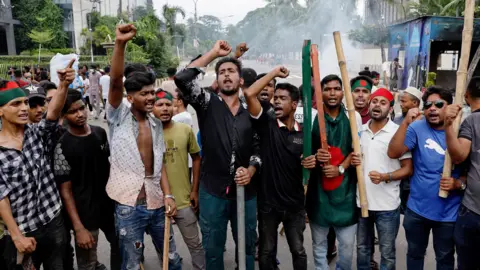UAE pardons Bangladeshis jailed for protesting
The president of the United Arab Emirates (UAE) has pardoned 57 Bangladeshis who were sentenced to long prison terms for staging protests in the Gulf state against their own government.
Three of the defendants received life sentences in July, while 53 others were jailed for 10 years and one for 11 years. They had been charged with gathering in a public place with the aim of inciting unrest.
The protests were held against the then Prime Minister of Bangladesh, Sheikh Hasina, in the weeks before she was ousted from power.
Protests are effectively illegal in the UAE, where foreigners make up almost 90% of the population. Bangladeshis are the third largest expatriate group.
 Reuters
ReutersHundreds were killed during weeks of unrest in Bangladesh, which were sparked by student-led demonstrations against quotas on government jobs. Sheikh Hasina resigned and fled the country for India on 5 August.
Reports say her attempts to seek asylum in the UK, the US and the UAE have not been successful so far.
President Sheikh Mohamed bin Zayed Al Nahyan’s pardon will “halt the implementation of sentences” and begin deportation measures for some of the Bangladeshi citizens, the UAE’s state news agency WAM said.
His decision to pardon the protesters follows a telephone call last month with Bangladesh’s interim Prime Minister, Nobel laureate Muhammad Yunus, who was installed following Ms Hasina’s flight.
According to state media, the 21 July trial of the 57 Bangladeshis heard their protests caused “riots, disruption of public security, obstruction of law enforcement, and endangerment of public and private property”.
Their court-appointed defence lawyer argued that the gatherings had no criminal intent and that the evidence was insufficient, WAM reported.
At the time of the trial Amnesty International condemned what it called the UAE’s “extreme reaction to the mere existence of a public protest” on its soil.
Human Rights Watch later said it had verified six videos of the protests posted to TikTok and X on 19 July.
The videos, filmed in the evening, show peaceful protesters chanting and marching down streets across the UAE.
The organisation said “none of the protesters were engaging in violent acts or using language to incite violence in their chant”.



